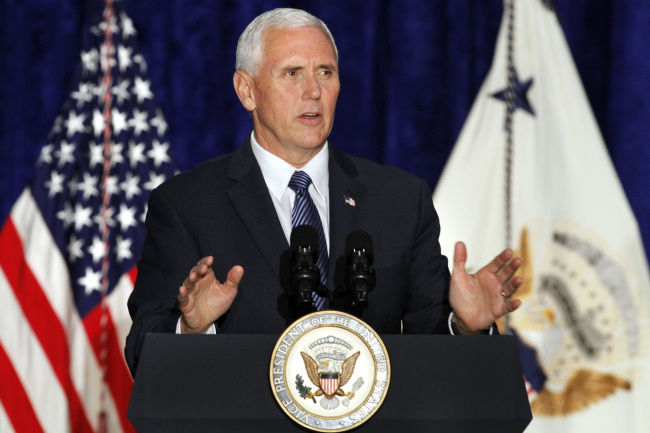With North Korea being defiant in its nuclear ambitions, US Vice President Mike Pence on Monday ruled out the possibility for any negotiations, vowing further economic sanctions instead of a “failed policy” of past administrations.

“(The US president) ought to be willing to sit down and explore common interests to advance peace, security and prosperity in the world in virtually every case, with North Korea being an exception, unless and until it permanently abandons its nuclear and ballistic missiles ambitions,” he said in an interview with “The Laura Ingraham Show.”
When the host said US President Donald Trump should not have a summit with North Korean leader Kim Jong-un, he replied, “Absolutely.”
“We’re going to isolate them more and more economically and diplomatically. We will not negotiate to negotiate which is a failed policy of multiple administrations of the past,” Pence added.
His remarks came as Washington pushes for a fresh round of crippling sanctions at the UN while crafting standalone measures over Pyongyang’s intercontinental ballistic test last Tuesday.
The US has given a draft to China late last week and Ambassador to the UN Nikki Haley aims to put a Security Council resolution to a vote “within weeks,” Reuters reported Tuesday, citing several senior UN diplomats.
But the vote may not take place quickly given the likely resistance of China and Russia, the veto-wielding standing members and the North’s staunch economic and diplomatic backers.
Last week, the 15-nation body failed to issue condemnations over the latest missile launch after Russia rejected to label it an ICBM. The UNSC took three months to adopt a resolution when Pyongyang carried out its last nuclear test in September, due chiefly to the Chinese objections with the level of the sanctions and language.
China’s Ambassador to the UN Liu Jieyi signaled the rough rides ahead yet again, saying in a Reuters interview on Monday that the council action would depend on how members “see the way forward.”
“We really must think very carefully about what is the best approach in the Security Council because a resolution, sanctions, are themselves not an objective,” he was quoted as saying.
Washington, meanwhile, is seeking to tighten its own sanctions against the Kim regime, targeting Chinese companies and banks suspected to have been “funneling cash” into its weapons program, the Wall Street Journal reported Tuesday.
The Trump administration has been displaying a greater willingness to slap secondary sanctions than its predecessor. In late June, it blacklisted two Chinese citizens and a shipping firm with alleged ties to Pyongyang, while designating the Bank of Dandong, based in the North Korea-Chinese border region, as a money laundering concern.
The issue is also expected to top the agenda for the top nuclear envoys of South Korea, the US and Japan, who met on Tuesday on the sidelines of a regional security forum in Singapore.
Seoul’s Foreign Minister Kang Kyung-wha said Monday the two countries are currently in consultations over the secondary sanctions.
“Whether it be a UNSC resolution or general sanctions, (the US) appears to be engaged in the UNSC negotiations on the position that it will place maximum economic pressure,” she said at a parliamentary session.
“If the UNSC negotiations are unsatisfactory, I think it would actively consider unilateral sanctions, on which it will closely coordinate with us.”
By Jung Min-kyung (mkjung@heraldcorp.com)






![[KH Explains] Can tech firms' AI alliances take on Nvidia?](http://res.heraldm.com/phpwas/restmb_idxmake.php?idx=644&simg=/content/image/2024/05/07/20240507050619_0.jpg&u=)


![[Grace Kao, Meera Choi] Has money displaced romance on dates?](http://res.heraldm.com/phpwas/restmb_idxmake.php?idx=644&simg=/content/image/2024/05/06/20240506050233_0.jpg&u=)








![[K-pop’s dilemma] Time, profit pressures work against originality](http://res.heraldm.com/phpwas/restmb_idxmake.php?idx=652&simg=/content/image/2024/05/08/20240508050705_0.jpg&u=20240508171126)
![[Today’s K-pop] NCT Dream to drop pre-release from 2nd Japan single](http://res.heraldm.com/phpwas/restmb_idxmake.php?idx=642&simg=/content/image/2024/05/08/20240508050725_0.jpg&u=)